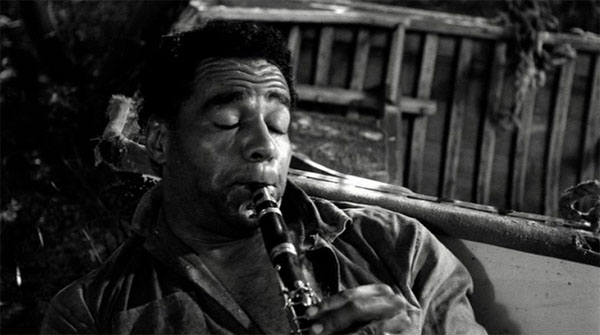Sneak previews of the film Laura Poitras is working on have made headlines the world over. That’s one way of looking at it. Another way: Glenn Greenwald’s interview with Edward Snowden is probably going to be the most riveting viewing experience of the year, regardless of whether or not you believe Greenwald and Poitras are on to a genuine story here. The most widely cited takedown so far comes from David Simon, creator of The Wire. It should be noted, of course, that his entry was posted before the Guardian released the Snowden interview. The story, as I’m sure you’re aware, has been unfolding over the past several days, beginning with the revelation that the NSA has been collecting phone records from Verizon customers, and swiftly moving on to further revelations that the NSA’s Prism program allegedly gives it direct access to the servers of major companies such as Google, Facebook, and Apple.
All that aside (the Daily, after all, is a film blog), what makes the 12’35” such endlessly fascinating viewing, apart from the eerily quiet views of Hong Kong‘s harbor that bookend it, is the calm and clarity with which Snowden discusses his potential ability to tap into President Obama’s email, the prospect of shutting down the entire global intelligence community in an afternoon, or even his own demise should the CIA decide to task the local triads with taking him out.
Poitras matches the sobriety, sticking to a straight-on, talking head shot, only occasionally punctuated with unassuming jump cuts. The conditions under which the interview was conducted have surely determined the style to a great extent, but knowing that doesn’t detract from the overall effect. In contrast, Poitras’s profile of another NSA vet turned whistleblower, William Binney, takes an approach more typical of recent documentaries. The Program, posted by the New York Times as an “Op-Doc” last August, cuts between the interviews and shots of imposing buildings, Binney driving, chatting with Daniel Ellsberg, and so on.
“The recipient of a 2012 MacArthur ‘genius’ grant, Poitras has been exploring issues surrounding the War on Terror for the last decade,” writes Scott Macaulay in a Filmmaker entry on her past and present work.
Meantime, recent discussion of Vulgar Auteurism is threatening to become a full-fledged debate. On Friday, Sundance Now published Nick Pinkerton‘s ferocious dismissal of VA as “a shameless attention grab. A critical tool of any use? Not so much.” The back-and-forth at Girish Shambu‘s place has been vigorous but not quite as emotionally charged. Hours later that same day, Ignatiy Vishnevetsky wrote in a comment:
The name itself is misleading. VA isn’t a separate critical framework. It isn’t a counter-canon.
In reality, VA is a loosely affiliated group of young cinephiles and critics. In Sarrisite terms, it’s more concerned with Expressive Esoterica than the Pantheon; nearly every thinkpiece about VA has focused on Tony Scott and, for some reason, Michael Bay (who isn’t actually that big with the VA crowd), but the bulk of VA activity actually focuses on directors like Paul W.S. Anderson, Jon M. Chu, John Hyams, Nimrod Antal, Isaac Florentine, Roel Reine, the Farrelly brothers, Neveldine & Taylor, and Russell Mulcahy. VA is also interested in performance, especially when it’s applied to action stars.
VA has two missions. The first is to mount convincing arguments in favor of figures it sees at major but undervalued: John McTiernan, Abel Ferrara, Walter Hill, etc. The second, larger mission involves exploring and analyzing the directors listed in the above paragraph.
More reading. Catherine Grant points us to the most recent downloadable issue of Cinephile, focusing on the voice-over.
Pierre Hombrebueno introduces Twitch readers to “5 Filipino New Wave Directors You Should Know (And Love).”
In a piece on the work of Hong Sang-soo for the Quarterly Conversation, Colin Marshall suggests that the closest American equivalent might be Hal Hartley.
From David Davidson: a translation of Henri Langlois‘s 1963 essay “The Modernity of Howard Hawks.”
Jonathan Rosenbaum‘s posted his 1993 review of “Buñuel‘s Neglected Masterpiece”: “The Young One [1960] doesn’t have the immediate impact or legibility of Buñuel’s best-known works, and though it never fundamentally betrays Buñuel’s leftist convictions, it confounds so many workaday rules of political correctness—left and right, then and now—that no one could ever see it as any sort of tract. Buñuel has rightly called it one of his most personal projects, and it also happens to be one of the most pungent films about the American south ever made—though it was shot in its entirety in Mexico.”
“He acted for Frank Capra, William Wellman, Ernst Lubitsch, Michael Curtiz, James Whale and Alfred Hitchcock, yet his name is barely known.” David Cairns: “There are at least two essays one could write about Clarence Muse: in one, the subject of race might not come up at all—looking at his deft comic and dramatic performances, we can appreciate his ability to steal a scene, or rather enhance it with an eye-catching contribution, just as we enjoy the nimble overplaying of a Eugene Pallette or a Franklin Pangborn. To talk about Muse as a black performer is, however, not only to acknowledge the obvious, but to give him additional credit for so often making something out of nothing, turning nameless manservants and train stewards into human beings.”
Also new at the Chiseler is the third and final part of Imogen Smith‘s article on Robert Mitchum: “[H]e has an oblique relationship to his own desires.”
At Movie Morlocks, Richard Harland Smith‘s posted an overview of the new issue of Shock Cinema.
New York. Tomorrow night at Light Industry, Peter Hutton introduces a screening of Johan van der Keuken’s The White Castle (1973).
London. At the ICA through Thursday: “Featuring Tilda Swinton in a tour de force one-woman performance, [John Maybury’s] Man to Man [1992] is a reworking of East German dramatist Manfred Karge’s play about a woman who experiences 50 years of German history in the guise of a working man.” David Jenkins in Little White Lies: “It’s a fascinating timepiece, harking back to an early ’90s heyday when there there existed such a thing as a British arthouse movie. Man to Man is very much of a piece with with the flamboyant Brechtian experiments of Derek Jarman, the audio-visual meshwork of Terence Davies and the transcendent, gender-switching provocations of early Sally Potter.”
James Franco in the Guardian: “I do love Hitchcock’s 1960 film, but Psycho Nacirema, the art installation I have made with the Scottish video artist Douglas Gordon, isn’t supposed to be a homage.”
Vienna. At tonight’s launch of the German-language version of Michel Cieutat and Phillippe Rouyer’s book Haneke on Haneke, Alexander Horwath will talk with Michael Haneke about the connections between the filmmaker’s TV work of the 1970’s and his most recent films. Also at the Austrian Film Museum, the series Burned Books opens on Wednesday and runs through June 22. It features adaptations of works burnt by the Nazis on May 10, 1933.
Listening. Mike Plante talks with Kevin Jerome Everson, whose films, in the words of the New York Times‘ Holland Carter, “about ordinary African-American life are completely unordinary.” His new feature, The Island of St. Matthews, will screen at the Los Angeles Film Festival next week. (84’10”)
As Peter Bogdanovich explained at his blog last week, there are at least three versions of his musical At Long Last Love (1975) out there. Now the one he likes best is out on DVD/Blu-ray, and Kim Masters talks with him about it and the rest of his career as well. (28’30”)
In the works. “Drafthouse Films and Films We Like have co-acquired North American rights to Ari Folman’s anticipated follow-up to Waltz With Bashir, The Congress, starring Robin Wright, Harvey Keitel, Jon Hamm and Paul Giamatti,” reports Indiewire‘s Nigel M. Smith. “The animated-live action hybrid opened the Cannes Director’s Fortnight sidebar this year and will hit theaters and VOD next year.”
In case you missed it on Friday, here’s the trailer for Woody Allen’s Blue Jasmine:
“Roald Dahl’s 1990 illustrated children’s novel about elderly lovebirds and tortoises will be adapted into a movie, starring Dustin Hoffman and Dame Judi Dench as the couple.” Flavorwire has more on Esio Trot.
Christoph Waltz “has come on board to star in the thriller True Crimes, based on the real-life events surrounding a cold case.” The Hollywood Reporter‘s Tatiana Siegel has details.
In other news. “The crowd-pleasing Broadway show Kinky Boots pulled off an upset victory as best musical at the Tony Awards on Sunday night, edging out the onetime front-runner, Matilda the Musical, while also scoring wins for Billy Porter’s lead performance and Cyndi Lauper’s music and lyrics in her Broadway debut as a composer.” Patrick Healy reports in the NYT.
Obit. The Guardian collects tributes to Iain Banks, “best known for his novels The Wasp Factory and The Crow Road, who has died just two months after announcing he had terminal cancer.” More from Tom Chivers (Telegraph), Neil Gaiman (Guardian), Jake Kerridge (Telegraph), and John Mullan (Guardian).
More browsing? See Mike Everleth and John Wyver.
Last bit of viewing. A fun parody of Room 237 via Flavorwire:
For news and tips throughout the day every day, follow @KeyframeDaily on Twitter and/or the RSS feed. Get Keyframe Daily in your inbox by signing in at fandor.com/daily.






